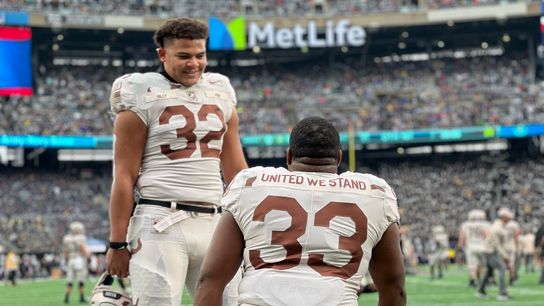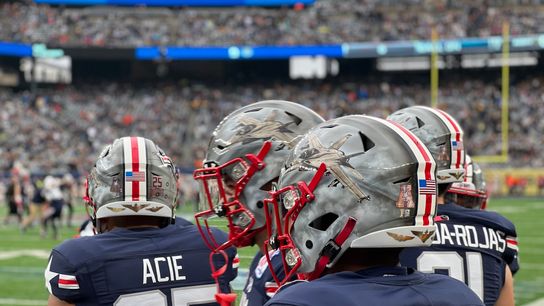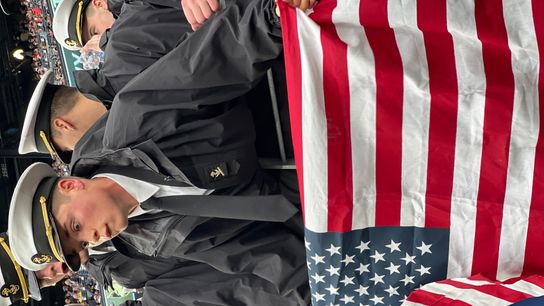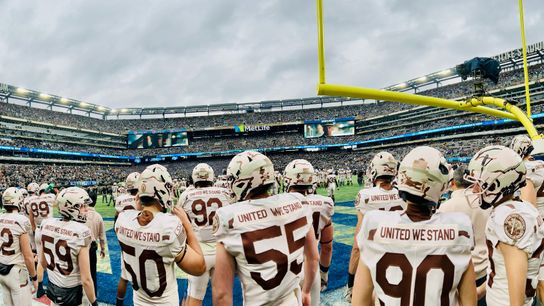JERSEY CITY, EAST RUTHERFORD, N.J. -- It’s more than a conference championship game, greater than any bowl berth or College Football Playoff selection.
America’s Game.
Army-Navy. Or, Navy-Army.
The 122nd iteration of the college football regular-season finale, the silver Commander-in-Chief’s Trophy the tangible reward in a game that means everything for bragging rights; think a sibling getting his or her parents to proclaim a favorite child.
Army granted FootballScoop behind-the-scenes access with the team Friday and Saturday leading into the game, played this year in MetLife Stadium – home of the NFL’s New York Giants and Jets – in front of a crowd of 82,282 with a nod to the 20-year anniversary of the 9-11 terrorist attacks on New York City, the Pentagon and in Pennsylvania.
“This is my 14th one of these,” Army head coach Jeff Monken, whose first foray into the rivalry was during a six-year run as a Navy assistant, tells FootballScoop. “There’s nothing like it.”
Friday, Army team headquarters at the Westin Hotel, Jersey City, New Jersey:
The Black Knights arrive the previous evening, busing down 60 miles from The Point for the full weekend encompassing this game.
Army conducts a light walk-through Friday, completing course work as well and staying loose but dialed into their preparations for Navy, a team struggling through a 3-8 season and – in a complete reversal in the recent history of this season – the program that’s found itself on the losing end in four of the previous five meetings.
Both teams are wearing custom-designed uniforms in the game; Army’s pay homage to Task Force Dagger – the U.S. Army Special Forces Unit that helped lead the country’s response against the Taliban in the aftermath of the 9-11 terror attacks that devastated New York City, killing more than 2,700 people in the coordinator plane hijackings that brought down the World Trade Center in Manhattan.

Not long after the team’s Thursday evening arrival, none other than the crew responsible for leading the nation’s response – and now being commemorated via the Black Knights’ uniforms – speaks to the entire Army team.
“Those guys gave us a flag,” Major Blake Powers, Army’s Admissions Support Officer for the football program, says. “It actually flew at their memorial in Washington, D.C. (the De Opresso Liber Memorial), and we’re going to run out onto the field tomorrow waving that flag. That’s what this game means to people.”
Army’s evening transitions from team meal into team meetings, breakout sessions and then dismissal to their rooms for relaxing and, quite likely, additional course work; after all, earlier this season on the evening prior to the team’s game at Wisconsin, double-digit members of the Black Knights were given physics exams at the team hotel.
Up first is the team’s brief hype video, a montage of highlights set to just-released hip-hop song “Game Over” that features a persistent chorus throughout its throaty, percussive beats: “I came to rise, you came to fall! I came to rise, you came to fall!”
When the video shows Brandon Walters, an Army tailback, making a dazzling tackle on special teams in the Black Knights’ resounding win last month at Liberty, the room erupts and Walters is briefly swarmed with hugs from a half-dozen or more teammates.
But emotion doesn’t rule this moment; isn’t where this Army team lives. The Black Knights, as well as their Navy counterparts, train too much, dwell in precision in every component of life to be overcome by the gradually building emotions for what both sides openly refer to as their most important game of the year.
Monken is direct. Army’s eighth-year head coach begins speaking at the front of the third-floor ballroom at the Westin. Soon, he is moving at a deliberate pace up and down the aisle. It’s important for Monken to be amongst his players, weaving into and out of their presence, walking alongside each row of team members.
The message is simple, the delivery tactical.
Monken relates to the ‘Horse Soldiers’’ discussion with the team about being the “tip of the spear.” It’s the underlying theme for Monken’s charge to his team as it sets less than 20 hours from kickoff against Navy.
“This is our game,” he says, “and it’s our game for each other. We’ve got 110 men in here. That means 109 men have got your back. Just do your job, men. Do your job. That’s all you have to do.”
It’s now time for offensive, defensive and unit-specific meetings.
Inside the defensive room, after venerable defensive coordinator Nate Woody outlines the final points of emphasis in the game plan, Powers addresses the team.
Earlier this season, Army began to have one defender each game carry a broad axe onto the field – the symbolic gesture rooted in the implement’s history in the rise of the Rangers as the preferred weapon of choice for Robert “White Devil” Rogers, widely considered the father of the U.S. Army’s modern-day Rangers.
“Going into our first game this year, one of the seniors ran out with a taped-up, piece-of-crap broad axe,” Powers, who keeps his Ranger Handbook nearby to this day, says. “It was like a company mascot thing. And it was like kind of a joke and Coach Monken said, ‘We’ve got to get something better than that.’
“So I just got one for the boys that was from this Viking company and engraved it for Army football. It reminded me of a Ranger hatchet, and Coach Woody said I want you to present it to a player every week. So I tried to relate it to Rogers’ standing orders, which are in the Ranger Handbook. The Ranger Handbook is a legendary, historic item that everyone who’s ever been to Ranger School takes with them.”
The passion of being a Ranger spilling out and emotion rising in his voice, Powers reveals senior defensive lineman Nolan Cockrill is carrying the axe Saturday afternoon.
“All the characteristics of the broad axe, and we strive to live up to that every single day,” Cockrill says. “I think that speaks a lot about the culture of this team, this program and what we’re trying to do, day in and day out.”
The final meeting is special teams, with a break-out session featuring Monken, special teams coordinator Sean Saturnio and other key staffers.
Coaches consult the team’s book of analytics, but Monken also is particularly zeroed in on the special teams elements.
Two things resonate: Monken tells his coaches, “We’re going to get a fake punt tomorrow. They’ve ran them all year. We’re going to get one.”
Monken also expresses confidence in his team’s kicker and punter, saying analytics and charts may be thrown to the wind in favor of gut-decisions during the game.
By the next afternoon, Monken is proved correct – for better and worse.
Tonight, though, their meeting is done by 9. What’s next for the head coach?
“Now, I get to go be dad,” he says. “That’s it. I’d imagine my daughter will want to swim.”
By 9:30, Dad is by the Westin’s indoor pool, and his daughter is joyously splashing through the water.
Saturday morning, Westin team hotel:
Team breakfast is 8, and mass is at 9. Monken is due on ESPN’s College GameDay, broadcasting live from MetLife Stadium, around 9:30.
Family buses depart around 10:45 for the stadium, and indeed it is very much a family affair. Monken's mother and father, wife, Beth, cousins, uncles and more travel from around the country, but mostly from the Midwest region near his Peoria, Illinois, roots for the game.
"His family used to have a business card that said, 'Monken's the name, football's the game,'" said John Clark, an uncle as well as a close family friend who eulogized late NBA broadcasting legend Craig Sager. "There were a dozen or more family members who all got into coaching football in Illinois."
At 11, there’s an extremely brief team meeting; final words. The work is done. It’s simply time to prepare for the nine-mile bus ride, replete with New Jersey State Police escort, to the stadium.
Pregame ceremonies honor servicemen and women from both branches, the Star-Spangled Banner features singing by members of both Army’s and Navy’s choirs, as per tradition. Each team is greeted with a dazzling flyover; four F/A 18 fighter jets for Navy; four helicopters, Blackhawks and Chinooks, for Army.
The game kicks off at 3:14 p.m., and before 3:20, Army already is out to a 7-0 lead after Christian Anderson’s 56-yard scoring rush.
Overall, Army controls most every facet of the first half – Navy has a signature, 11-play, 83-yard touchdown drive led by backup quarterback Tai Lavatai that briefly ties the game – but it sees a pair of promising marches end in Cole Talley field goals.
At halftime, it’s 13-7 Army. No one knows it at the time, but the Black Knights’ scoring is done.

Six minutes into the third quarter, Navy takes its first lead of the game, 14-13, after Lavatai caps a 10-play, 74-yard drive with his second scoring plunge.
Still, Army isn’t short on opportunities. And the first of Monken’s special teams prophecies rings true.
Army punter Zach Harding drops a 50-yarder that squirts out of bounds at Navy’s own 1-yard line. This is Army’s chance to flip the field, to perhaps even reclaim the lead with a safety. A blocked punt.
Navy does just enough to push off its goal line, punts the ball away and then sends the Army offense uncharacteristically stumbling backwards.
The Midshipmen tack on Bijan Nichols’ 43-yard field goal with 6 minutes, 10 seconds left on the game clock and time is slipping away for the Black Knights to keep alive hopes of a potential 10-win season, as well as sole possession of the Commander-in-Chief’s Trophy.
Noteworthy on Navy’s final scoring possession: Monken’s other prediction of a fake punt. The Midshipmen, from their own 34-yard line, direct-snap the ball to Diego Fagot on fourth-and-1, and in the senior all-conference linebacker’s first career carry, he shakes off his surprise of receiving the football to stumble forward 4 yards for the first down.
Army musters two more possessions – and its last one ends on the plus-50, at Navy’s 46. The Black Knights needed at least one more yard, less than a yard per replays, in order to try to extend the program’s most successful stretch since the onset of the 1990s against the Midshipmen.
Players acknowledge “to lose to them is very disappointing.”
Monken expects that “I will probably throw up when I watch (film of this game).”
Nonetheless, this program’s health and trajectory here today, even in the immediate aftermath of this come-from-ahead loss, are undeniable since Monken’s arrival prior to the 2014 season.
Still with the Armed Forces Bowl left to play against Missouri Dec. 22, the Black Knights have an opportunity for a nine-win season and the program’s 52 win since the start of the 2016 campaign.
The context? From 1997 through 2013, Army football won just 50 total games.
“I like the culture of our program, I like our team, I love our players,” Monken says. “They drive that culture, it’s their responsibility to maintain it; they’re stewards of that culture. I think they’ve built a really good culture. They’re positive, and we’re just really disappointed about today.
“It’s difficult to feel like it’s a good year when we lose this game. There will be motivation to win the last one, to try to beat Missouri in the bowl game.”

